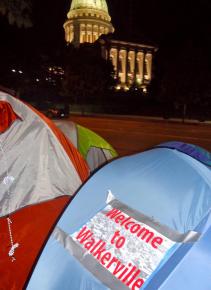Anger at an attack on Wisconsin workers
reports from Madison, where protesters are outraged at the Wisconsin Supreme Court's decision in favor of a law restricting collective bargaining.
MORE THAN 1,000 activists joined hundreds of Walkerville tent city residents to surround the Capitol building on June 14 in opposition to budget cuts--and the state Supreme Court's ruling that day to restore Gov. Scott Walker's law restricting collective bargaining rights for public-sector workers.
Protesters turned out to stand up against Gov. Scott Walker's draconian budget cuts, which will chop away at public spending for education, health care and environmental protections, to name only some of the areas where funding is being cut. Activists have organized a makeshift tent city, known as Walkerville, running along one side of the Capitol Square in Madison, to serve as a base camp for protests against the budget.
But the same day, the state Supreme Court announced it was overturning a lower court's decision halting an anti-union law that eliminates the right for public-sector unions to bargain for anything but wages. This legislation sparked an uprising in Wisconsin, including the occupation of the Capitol for several weeks to block the bill from being rammed through the legislature.

Matt Douglas, a print services worker with the University of Wisconsin Department of Information Technology (DOIT), was among the protesters on June 14.
Douglas, who is excited about soon becoming a father for the first time, explained that his exuberance is tempered by economic concerns for his new family. His job at DOIT pays $28,000 a year, but starting with his next paycheck, that salary will effectively drop to $25,000 due to the tripling of contribution rates for health care and retirement benefits.
Douglas knows this is unfair, and he blames both political parties. "We've already taken cuts in benefits and pay," he said. "I've had this job at DOIT for three years, and all we've ever received are cuts and freezes. I'm here to protect my collective bargaining rights and to protest this budget, but I'm also here to let the Democrats know they have work to do to become a respectable party...to back up their talk."
Susan Lucht and Lynna Winters, who work at the Veterans Affairs (VA) office in King, Wis., said, "We drove down here because we can't afford the 10 percent increase in benefit contributions, and to oppose plans to privatize the VA system. New workers are working full time without benefits."
Lucht was hoping to see more labor representation at the protest, but was "glad to be protesting in Madison again, nonetheless."
The budget bill wasn't voted on today, but protesters were surprised to find out that the Supreme Court ruled on the collective bargaining law.
Republicans legislators, who rammed through the bill to end collective bargaining in March--in violation of the state's open meetings law, according to opponents--threatened to reintroduce its provisions this week unless the state Supreme Court overturned Dane County Circuit Court Judge Maryann Sumi's ruling in March, which stated that the bill was passed illegally and therefore was invalid.
While activists knew the Supreme Court would consider taking up the case today, nobody expected a ruling. But corporate-backed legislators and judges, acting with unprecedented zeal, arranged a hasty vote, and the court declared the passage of Walker's anti-union attack to be legal and valid.
Chief Justice Shirley Abrahamson stated in her dissent, "Today, the majority announces for the first time that it is accepting the case. And today, the majority decides the case."
Inside the Capitol rotunda, Wisconsin's "Fab 14"--the Democratic senators who left the state in February to delay passage of the anti-labor bill--left the Senate chamber to greet protesters who were just finishing up a noon-hour solidarity sing-along. As they waved, a chant of "Tax, tax, tax the rich!" swelled from the crowd. It was another sign that activists recognize this fight is far from over.


